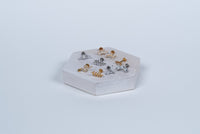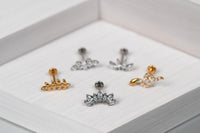Disclaimer: This article does not provide clinical or medical advice. Always consult a professional piercer or healthcare provider with questions about piercing care.
If you're a piercing professional or enthusiast, you've probably noticed that some piercings simply heal better than others. The choice of jewelry plays a crucial role in this process. Research and experiences from thousands of users show that implant-grade titanium jewelry leads to faster and problem-free healing. This happens because of titanium's unique biocompatibility - the body barely recognizes it as foreign material, minimizing irritation and allergic reactions.

Why Titanium Has Become the Gold Standard
Titanium has proven itself as the safest material for fresh piercings. Unlike surgical steel, titanium contains no nickel or other allergens that can cause irritation. The material is also used for medical implants like bone pins and heart valves - if your body can handle a titanium hip replacement, it can certainly manage a titanium earring.
The advantages of titanium become clear when we understand what happens during the healing process. When you get a piercing, you're essentially creating a controlled wound that needs to heal around a foreign object. Your immune system immediately starts working to repair the tissue while accommodating whatever jewelry is placed there. With titanium, this process encounters minimal resistance because the material is incredibly inert and hypoallergenic.
Understanding the Science Behind Faster Healing
Clinical studies have shown that titanium piercings experience significantly fewer complications compared to stainless steel. Participants with titanium jewelry were much less likely to experience allergic reactions and infections. This translates directly to faster overall healing times because the body isn't fighting against the material while trying to repair itself.
The biocompatibility of titanium means your immune system can focus entirely on healing rather than trying to reject or react to the jewelry. This is particularly important during the initial weeks when the piercing channel is forming and the most vulnerable to complications.
Common Problems That Titanium Helps Avoid
Many piercing complications stem from material-related issues that titanium naturally prevents. Surgical steel, while historically common, contains nickel and other elements that can leach into wound tissue over time. Even people who think they tolerate steel well often discover dramatic improvements when switching to titanium.
Users frequently report that stubborn, unhealed piercings that had been problematic for months suddenly calmed down almost immediately after switching from steel to titanium. The piercing became less itchy and irritated once titanium was in place. This happens because titanium eliminates one of the major variables that can complicate healing - metal sensitivity and irritation.
Quality control issues also plague the piercing jewelry market. Some jewelry sold as "titanium" is actually surgical steel upon closer inspection. This false advertising can lead to prolonged healing times or allergic reactions if you unknowingly keep nickel-containing steel in a piercing. The frustration is understandable - people feel cheated that trusting a bad supplier harmed their piercing.
What to Look for When Purchasing Piercing Jewelry
For piercing studios and consumers alike, knowing how to identify genuine quality jewelry is essential. When sourcing titanium jewelry, always look for ASTM F136 certification. This specification ensures you're getting true implant-grade titanium rather than a lower grade alloy.
Reputable suppliers will provide mill certificates for their materials and won't hesitate to discuss the specific grades and standards their jewelry meets. If a deal seems too good to be true - like suspiciously cheap "titanium" from an unknown vendor - approach with caution.
Design Matters as Much as Material
Design matters as much as material. Even genuine titanium jewelry can cause problems if poorly designed. Look for internally threaded or threadless designs rather than externally threaded pieces, which can cause micro-tears when inserted. Flat-back labret studs tend to heal better than butterfly-back designs, which can trap bacteria and debris.
The jewelry's fit is equally important. Posts that are too long allow excessive movement that can irritate healing tissue, while pieces that are too short can embed as swelling occurs. Professional piercers understand the importance of proper sizing and planning for downsizing as healing progresses.
Titanium vs. Other Materials: Making Informed Choices
While titanium excels for initial piercings, understanding alternatives helps make informed decisions. High-quality solid gold (14k or 18k, nickel-free) is equally safe for most people, though titanium maintains a slight edge in being completely hypoallergenic. Gold offers more design variety but comes at a higher price point.
Surgical steel, despite its medical-sounding name, is actually inferior to both titanium and quality gold for piercing purposes. The term "surgical" is more marketing than guarantee - there are roughly 450 different mixes that qualify as surgical steel, and virtually all contain some nickel.
For studios building inventory, titanium offers the best balance of safety, durability, and cost-effectiveness. It allows you to confidently recommend jewelry that will work well for the vast majority of clients, regardless of their sensitivity levels.

Popular Titanium Jewelry Types for Optimal Healing
Different piercing locations benefit from specific jewelry styles. Labret studs work excellently for ear piercings, lip piercings, and many facial piercings due to their flat-back design that doesn't catch on clothing or hair. For those seeking easy-to-use options, clicker jewelry provides convenience without sacrificing safety.
Body piercings have their own requirements. Titanium belly jewelry offers the biocompatibility needed for navel piercings, which can be slow to heal due to their location and movement. Nipple rings in titanium provide comfort for these sensitive piercings while maintaining the strength needed for long-term wear.
The Long-Term Benefits Beyond Initial Healing
Choosing quality materials like titanium benefits clients long after their piercings heal. Many people develop metal sensitivities over time through repeated exposure to allergens like nickel. Using titanium from the start helps prevent the development of sensitivities that could make future jewelry choices problematic.
Clients who invest in quality jewelry often report better long-term comfort and fewer issues with irritation, even years after healing. This builds trust and encourages return visits for additional piercings or jewelry upgrades.
Building Your Professional Reputation
For piercing studios, consistently using implant-grade materials demonstrates professionalism and care for client wellbeing. When clients experience smooth healing with quality jewelry, they become walking advertisements for your services. Word-of-mouth recommendations from satisfied clients who healed well are invaluable for building your reputation.
Educating clients about jewelry quality also positions you as a knowledgeable professional rather than just someone who pokes holes. This expertise justifies your pricing and helps clients understand the value of investing in quality pieces like titanium segment clickers or precision-made titanium balls for existing jewelry.
FAQ
Q: Is titanium jewelry always more expensive than surgical steel?
Initially yes, but titanium prevents complications that cost more long-term. The price difference is usually modest and worth it for the improved healing experience and reduced risk of problems.
Q: Can I be allergic to titanium?
True titanium allergies affect less than 1% of people. If you're having issues with "titanium" jewelry, it's more likely to be poor quality material, fake titanium, or other factors like jewelry design or aftercare.
Q: How do I know if my titanium jewelry is genuine?
Look for ASTM F136 certification and buy only from reputable suppliers. Genuine titanium may look duller than shiny steel, and quality vendors will provide material certificates upon request.
Q: Will titanium make my piercing heal faster than normal?
Titanium doesn't speed healing beyond normal timelines, but it prevents complications that slow healing down. You'll still need proper aftercare and patience, but you'll avoid many common problems.
Q: Should I switch existing piercings to titanium jewelry?
If you're experiencing any irritation, switching often helps immediately. Even without problems, upgrading to titanium provides better long-term comfort and prevents potential sensitivity development.

ASTM F136 Titanium Piercing Jewelry Care Guide for Studios: Complete Maintenance Instructions<
ASTM F136 titanium jewelry requires simple maintenance: clean with mild soap and water, use ...

Titanium Labrets: The Ultimate Guide for Safe Piercing Jewelry
Titanium labrets are the gold standard for safe piercing jewelry. They offer excellent biocompatibil...

